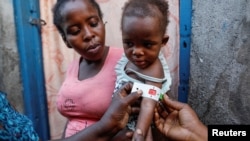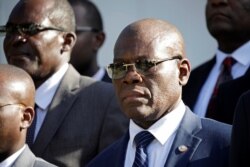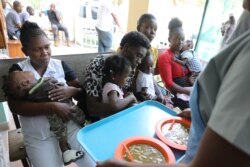Haiti’s humanitarian needs “remain at a disturbingly high level,” a U.N. official says, with almost half of the population in need of assistance.
Bruno Lemarquis is deputy special representative of the United Nations Integrated Office in Haiti, known as BINUH. He is also U.N. resident and humanitarian coordinator in Haiti.
He spoke Wednesday during a briefing by the U.N.’s humanitarian affairs office, known as OCHA. The meeting took place virtually because of the coronavirus pandemic and involved various U.N. agencies and representatives, as well as other stakeholders.
Lemarquis said the current humanitarian situation in Haiti is comparable to that of South Sudan and the Central African Republic, which have seen years of strife. “But there is no war,” he noted. “We are in the middle of the Caribbean.”
He is calling for an integrated approach to help the country better stand on its own and for the international community to step up and contribute to funding for Haiti.
Lemarquis says only about one-third of the funds designated for Haiti has come through.
Forty percent of Haiti’s population — about 4.4 million people — need humanitarian assistance, OCHA says. In its 2021-2022 Humanitarian Response Plan, OCHA seeks $235.6 million in funding to implement a four-point plan aimed at meeting strategic goals.
Those objectives include: Nexus — reduce by 20% the number of people who need assistance; Basic Needs — meet the needs of 60% of the population; Protection and Accountability — protect the most vulnerable groups; Preparedness — prepare to respond quickly to needs of people following a natural disaster or other “shocks.”
The plan provides for mitigating acute food insecurity, providing access to clean water, sanitation, hygiene, emergency health services and education.
Haitian Prime Minister Joseph Jouthe, who is also the country’s planning and external cooperation minister, highlighted a convergence of crises that have made the situation much worse. He cited the political turmoil, insecurity, “Peyi Lok” (a series of protests that “paralyzed” the country and negatively impacted the economy), high inflation and the pandemic.
“We reiterate the need for coherent and effective assistance,” Jouthe said. The minister said assistance so far has provided mixed results, prompting the government of President Jovenel Moise to question its effectiveness.
“We need to adapt the projects to the needs of the country,” Jouthe said, “so the response provided truly meets our needs.”
Ambassador Elisabeth Millard, the U.S. representative to the U.N. Economic and Social Council, underscored America’s commitment to Haiti’s humanitarian cause.
“We remain the largest single donor of humanitarian assistance worldwide and in Haiti.” Millard added, “A rapid, effective and principled response is needed,” and that efforts must be made to avoid duplication.
Ambassador Jose Blanco, the representative of the Dominican Republic, which shares a border with Haiti, said his country is extremely concerned. He described the situation as "dire" and a “multi-hazard risk” requiring the full attention of the international community.
“All efforts must lead to solving the political situation, minimizing the effects of COVID-19 on Haiti’s economy,” he said. COVID-19 is the disease caused by the coronavirus.
France’s representative, Ms. Sophie Lecoutre, urged “equitable access” to the COVID-19 vaccine. “COVAX has a role to play” she said, adding, “We must strengthen cooperation between humanitarian actors.” COVAX is the global mechanism that aims to deliver coronavirus vaccines to poor countries.
Canada’s ambassador to the U.N., Robert Rae, called on Haiti’s government to deal with political insecurity by participating in an inclusive dialogue with the political opposition and stakeholders. “There may be serious long-term consequences,” Rae said, if this issue goes unresolved.
Representatives of the U.N.’s World Food Program (WFP), World Health Organization (WHO) and Pan American Health Organization (PAHO) spoke of their contributions to alleviate food insecurity and deficiencies in Haiti’s health sector.
NGO (non-governmental organization) Action Against Hunger’s representative in Haiti said after 36 years on the ground, his organization has noticed “an alarming level of donor disengagement” in life-saving interventions.
“It is very important for the international community to stay in solidarity with the Haitian people,” he said. “We might face a situation that is irreversible in the future.”
Michael Kohler, deputy director-general of the European Civil Protection and Humanitarian Operations (ECHO), announced that $17 million in “fresh humanitarian assistance” was being made available for Haiti. Kohler said the funds would save lives and provide protection for migrants and victims of violence. He said humanitarian donors should prepare for the day when Haiti will be able to stand on its own.
“Rest assured, the EU will remain engaged as a humanitarian donor in Haiti as long as the needs are there,” Kohler said, adding, “The years ahead will be crucial.”
Margaret Besheer contributed to this report.






